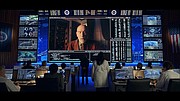Netflix’s ‘Space Force’ finds a voice as it goes along
Though it remains atop the list of Netflix’s most watched new offerings, the Steve Carell-led comedy series, “Space Force” has garnered a mixed response from critics and audiences.
Created by Carell alongside Greg Daniels (the creator of the U.S. incarnation of “The Office”), “Space Force” has the disadvantage of being compared to Carell and Daniels’ beloved previous collaboration. In fairness, “Space Force” isn’t trying to be “The Office,” and it often approaches comedy in very different ways.
“Space Force” more resembles the political satire of HBO’s “Veep,” though it admittedly isn’t as sharp-witted as that Julia Louis-Dreyfuss series. At least not yet. Carell plays General Naird, the decorated Air Force man tasked by the government to get “boots on the moon” by 2024. John Malkovich plays the newly-created agency’s science director, Dr. Mallory, and the talented regular cast also includes Ben Schwartz (“Parks & Recreation) as the agency’s obnoxious PR consultant , Jimmy O. Yang (“Silicon Valley”) as another head scientist and comedian Tawny Newsome as an aspiring astronaut.
Like many pilots, “Space Force’s” first show prioritizes plot over laughs, and it takes a couple of episodes for “Space Force” to really establish its tone. The sillier elements, including a storyline focused on a monkey astronaut mission, can occasionally feel at-odds with the more deadpan comedic elements, though the brilliant cast (especially Carell and Malkovich) mine humor from all situations.
The recurring cast also boosts the show at several opportunities. Multi-episode appearances by Jane Lynch, Noah Emmerich, the late-great Fred Willard and especially Lisa Kudrow as Naird’s wife all fill in the fictionalized world of an unsupervised and chaotic federal government (connections to our real world are pointed-but-deliberately non-specific).
Sincerity ultimately became the key ingredient to the American version of “The Office,” a show that also struggled for a few episodes to find its comedic rhythm. Carell’s General Naird, while rigid and emotionally distant, is far less incompetent than Michaecl Scott, but there’s a familiar sincerity to the character that builds into the heartbeat of “Space Force.” The work of their agency is often ridiculous and needlessly expensive, but Naird believes in its humanitarian vision. As the show builds to a potentially catastrophic confrontation with the Chinese space program, Naird’s compassion begins to clash with his government’s wreckless posturing.
It’s also worth watching a few episodes just to see John Malkovich’s character grow progressively frustrated with his military counterparts. Malkovich is nothing but delightful when exasperated.
Even after it finds its footing in the back half of the season, “Space Force” could still use some tuning going forward. The show especially struggles to work in the character of Naird’s teenage daughter (played by Diana Silvers), and a few episodes that run more than 30 minutes need a sharper editing hand.
“The Office” didn’t get off to a perfect start, either. Though they’re going for different things, “Space Force” could be another type of success for Carell and Daniels. The talent is certainly there for another worthwhile, deep run.
• • •
Tyler Wilson can be reached at twilson@cdapress.com. He’s been writing professionally about movies since 2000 and is the co-host of Old Millennials Remember Movies, available everywhere you get podcasts and at OldMillennialsRemember.com.





